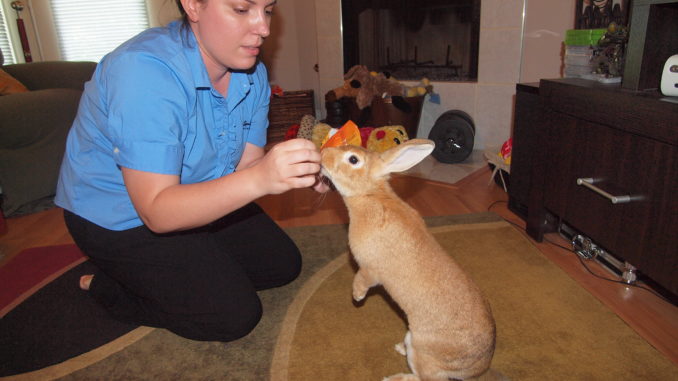
Luling woman tells why these Easter favorites make great pets year-round
They also require a lot of maintenance which can be hard for small children to keep up.
Many children will be looking forward to the Easter Bunny visit ing their homes this weekend – but Luling’s Renee Simpson already has two at her house.
Simpson’s pet rabbits occupy a little place in her home but a big place in her heart.
“My first and only furry pet growing up was a rabbit we named Rabby,” Simpson said. “I learned a lot taking care of her, and I knew from then on rabbits would most likely always be a part of my home as an adult.”
Growing up, her Godparents raised rabbits for food, but she rescued Rabby from the farm. The early exposure to bunny behavior made Simpson an ideal child to have a pet rabbit.
But not all children can find a hopping best friend like Simpson. Because they are prey animals, rabbits can become very nervous and anxious around loud noises and quick movements and when being picked up.
“All rabbits chew (they have to grind down their ever-growing teeth), most rabbits shed copious amounts of fur and most dislike being picked up,” Simpson said.
She added that rabbits can be pretty aggressive when they feel defensive.
“I have witnessed my male rabbit, Reggie, growl and karate chop my dog,” Simpson said. “For the vast majority of bunnies, they are not ‘cuddly’ creatures that enjoy being poked, picked up and annoyed.”
But they do love being petted and adored.
“Most love being petted while firmly attached to the ground, but it definitely has to be on their terms,” Simpson said.
Simpson said that she is always learning something new about bunnies from her two current hoppers, Reggie and Kizzy.
“Even though I’ve been Reggie’s owner for over two years now, he still manages to surprise me as he continues to get accustomed to being a house rabbit,” she said. Reggie was originally found in the Bonnet Carre Spillway in “pretty bad shape” before Simpson adopted him from the St. Charles Animal Shelter.
She said that most people have misconceptions about keeping rabbits as indoor pets – and that rabbits are much more like other house pets than people may believe.
“In a lot of ways, cats and rabbits are very similar,” Simpson said. “For example, a lot of people don’t realize that rabbits can be litter-box trained very easily”
Simpson said that bunnies can also clean themselves like cats and hate to be washed in a bathtub of water. But they also share some negative traits with cats, like territorial spraying.
“It’s best to get rabbits spayed/neutered, too,” Simpson said. “It usually eliminates nuisance behavior like territorial spraying and reduces the risk of certain types of cancer.”
Rabbits also require a large cage or habitat that will allow them to move around freely, water, grass hay, vegetables, fruits, treats, toys and litter boxes to live a full, happy and healthy indoor life.
But for those parishioners that are ready to welcome the little bundles of fur into their homes, Simpson knows just how much these small pets can become a big part of your life.
According to The Humane Society, rabbits are the species most often surrendered to animal shelters after cats and dogs. Most rabbits lose their homes because of “people problems” like a move or an owner’s loss of interest in caring for the animal – not because the rabbit has behavioral or health problems.
While Simpson said her bunnies don’t seem to realize it is Easter this weekend, they will still have a little celebration.
“They get some extra treats from us for Easter because after all it’s ‘their time of year,’” Simpson said.
To find listings of adoptable bunnies near you, visit www.petfinder.com or www.rabbit.org.




Be the first to comment